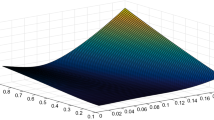Abstract
We present how agent-based models can be used to correct for biases in a sample. The approach is generally useful for behavioural experiments where participants interact over time. The model we developed copied mechanics of a behavioural experiment conducted earlier, and agents in the model faced the same strategic choices as human participants did. We used the data from the experiment to calibrate agent behaviour such that agents reproduced patterns observed in the experiment. After this learning phase, we resampled agents such that their characteristics (political orientation) were similar to those found in the real world. We found that after the correction for the bias, agents produced patterns closer to those commonly found.
Access this chapter
Tax calculation will be finalised at checkout
Purchases are for personal use only
Similar content being viewed by others
Notes
- 1.
To help the comparison, the original values were rescaled into our 11-point scale.
- 2.
Following the protocol, 800$ were used to offset the emission of 2050 t CO2.
References
Farjam, M., Nikolaychuk, O., Bravo, G.: Does risk communication really decrease cooperation in climate change mitigation? Clim. Chang. 149(2), 147–158 (2018)
Farjam, M., Nikolaychuk, O., Bravo, G.: Experimental evidence of an environmental attitude-behavior gap in high-cost situations. Ecol. Econ. 166, 106–434 (2019)
Milinski, M., Sommerfeld, R.D., Krambeck, H.J., Reed, F.A., Marotzke, J.: The collective-risk social dilemma and the prevention of simulated dangerous climate change. Proc. Natl. Acad. Sci. 105(7), 2291–2294 (2008)
Dannenberg, A., Löschel, A., Paolacci, G., Reif, C., Tavoni, A.: On the provision of public goods with probabilistic and ambiguous thresholds. Environ. Resour. Econ. 61(3), 365–383 (2015)
Paolacci, G., Chandler, J., Ipeirotis, P.G.: Running experiments on Amazon Mechanical Turk. Judgm. Decis. Mak. 5(5), 411–419 (2010)
Wilensky, U.: NetLogo. Center for Connected Learning and Computer-Based Modeling. Northwestern University, Evanston (1999)
Belot, M., Duch, R., Miller, L.: A comprehensive comparison of students and non-students in classic experimental games. J. Econ. Behav. Organ. 113, 26–33 (2015)
Tavoni, A., Dannenberg, A., Kallis, G., Löschel, A.: Inequality, communication, and the avoidance of disastrous climate change in a public goods game. Proc. Natl. Acad. Sci. 108(29), 11825–11829 (2011)
Author information
Authors and Affiliations
Corresponding author
Editor information
Editors and Affiliations
Rights and permissions
Copyright information
© 2020 Springer Nature Switzerland AG
About this paper
Cite this paper
Farjam, M., Bravo, G. (2020). Fixing Sample Biases in Experimental Data Using Agent-Based Modelling. In: Verhagen, H., Borit, M., Bravo, G., Wijermans, N. (eds) Advances in Social Simulation. Springer Proceedings in Complexity. Springer, Cham. https://doi.org/10.1007/978-3-030-34127-5_14
Download citation
DOI: https://doi.org/10.1007/978-3-030-34127-5_14
Published:
Publisher Name: Springer, Cham
Print ISBN: 978-3-030-34126-8
Online ISBN: 978-3-030-34127-5
eBook Packages: Mathematics and StatisticsMathematics and Statistics (R0)




